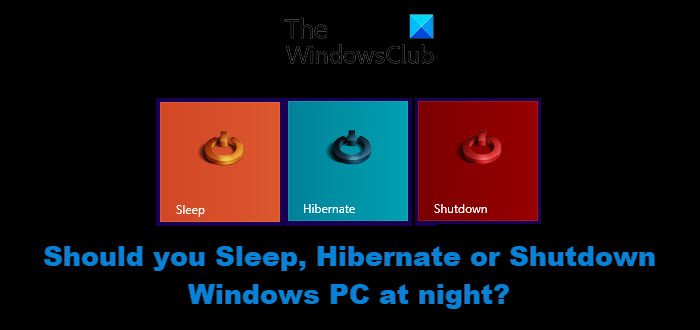A question most energy-conscious folks have! Should I hibernate or shut down my Windows 11 or Windows 10 computer at night? Which is better? In this article, we explore both options, and then you can decide for yourself.

When to Sleep, Hibernate, or Shutdown PC?
If you’re a Windows user, Microsoft suggests that you just set up your PC to “hibernate” overnight. “Hibernate” powers down your monitor to about 5 watts of energy and your PC to 2.3 watts—virtually the same as turning your PC off (your monitor uses zero watts when turned off. Either way, you save as much as $90 a year in power costs compared to a PC left on with a 3-D screen saver running.
If you used the “hibernate” feature of Windows XP (and previous versions including Windows 2000 and Windows Me), or even the “sleep” feature of most new Dell and other PC models, it really did not matter much – if you shut down or hibernated.
Even the folks at Energy Star agree you save almost as much energy as you do turning off your computer for the night (minus unplugging it). And you won’t have to endure a lengthy “re-booting” process the next morning; your computer should “wake up” in 30 seconds or less.
Those at Energy Star still prefer that you turn your computer off at night, for maximum energy savings. “We are all about energy savings, and when you shut off your computer at night, you save the most energy,” says Craig Hershberg, program manager for office equipment and consumer electronics. “Every little bit helps. It all adds up.”
Read: Difference between Sleep, Hybrid Sleep & Hibernation.
When to use Sleep Windows PC
Use Sleep if you plan to stay away from your PC and maybe not work for a couple of minutes or hours. This uses very little power, your PC starts up faster, and you’re instantly back to where you left off. On desktops, you may use the Sleep option instead, on the latest PCs which have a Hybrid sleep feature. It is a combination of sleep and hibernates; it puts any open documents and programs in memory and on your hard disk and then puts your computer into a low-power state so that you can quickly resume your work.
When to use Hibernate Windows PC
Use Hibernate during the night and when you plan to work again the next morning. Hibernate uses less power than sleep and when you start up the laptop again, you’re back to where you left off quickly.
When to Shut down Windows PC
Use Shutdown at night if you do not plan to use the PC for the next 1 or more days. Shutting down the PC once a week is always a good idea.
However, here are some consumer “myths” that are worth addressing:
- Turning your PC off uses more energy than leaving it on. Not true. The small surge of power you use when turning it on—which varies per PC make and model—is still much smaller than the amount you use in keeping it on for lengthy periods.
- Turning your PC on and off wears it out. A decade ago, there was something to this, but not today, say Hershberg and others. It used to be that PC hard disks did not automatically park their heads when shut off, and that frequent on/off cycling could damage the hard disks. Today’s PCs are designed to handle 40,000 on/off cycles before a failure, and that’s a number you likely won’t reach during the computer’s five-to-seven-year life span.
Screen savers save energy. Not true. Screen savers, at a minimum, can use 42 watts; those with 3-D graphics can use as much as 114.5 watts. It’s absolutely wrong thinking that a screen saver will save energy. - Your computer uses zero energy when “off.” That’s true only if it is unplugged. Otherwise, the PC utilizes “flea power,” or about 2.3 watts, to maintain local-area network connectivity, among other things. In “hibernate” mode, your PC uses the same 2.3 watts; in “sleep” mode, your PC uses about 3.1 watts. Monitors do use zero energy when turned off.
What do you do normally? I usually Hibernate every day, but make it a point to shut down on weekends or when I am sure that I’m not going to be using my PC the next day.
Read next: Should I turn off my Router or WiFi Network when not in use?